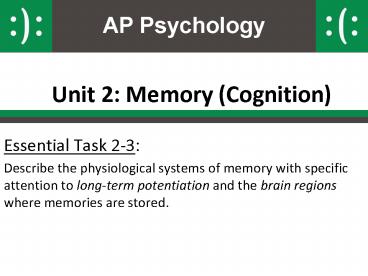Unit 2: Memory (Cognition) - PowerPoint PPT Presentation
1 / 8
Title:
Unit 2: Memory (Cognition)
Description:
AP Psychology Unit 2: Memory (Cognition) Essential Task 2-3: Describe the physiological systems of memory with specific attention to long-term potentiation and the ... – PowerPoint PPT presentation
Number of Views:90
Avg rating:3.0/5.0
Title: Unit 2: Memory (Cognition)
1
Unit 2 Memory (Cognition)
- Essential Task 2-3
- Describe the physiological systems of memory with
specific attention to long-term potentiation and
the brain regions where memories are stored.
2
(No Transcript)
3
Essential Task 2-
Outline
- Physiology of Memory
- Process
- long-term potentiation
- Stress hormones
- Where Brain Structures
- Hippocampus
- Where the memories are processed
4
How are the Memories Stored?Synaptic Changes
- Long-Term Potentiation (LTP) A long-lasting
change in the structure or function of a synapse
that increase the efficiency of neural
transmission.
5
Stress Hormones Memory
- Heightened emotions (stress-related or otherwise)
make for stronger memories. - Hormones such as Epinephrine act on brain centers
in the brain - Extreme stress undermines learning and later
recall - How does this apply to an exam?
6
Brain structures
- Hippocampus turns STM into LTM
- The hippocampus (named after its resemblance to
the seahorse, from the Greek hippos meaning
"horse" and kampos meaning "sea monster")
7
Where Are Memories Stored?
8
Biological Forgetting Factors
- Damage to the Hippocampus
- Difficulty forming new memories
- Diminished in Alzheimers patients
- Neurotransmitters play a role
- Acetylcholine
- Alzheimers patients show low levels of this
- Decay theory
- Memories deteriorate because of the passage of
time - Distractor Studies information fades from STM































